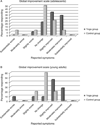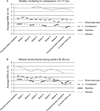Iyengar yoga for adolescents and young adults with irritable bowel syndrome
- PMID: 25025601
- PMCID: PMC4146428
- DOI: 10.1097/MPG.0000000000000366
Iyengar yoga for adolescents and young adults with irritable bowel syndrome
Abstract
Objectives: Irritable bowel syndrome (IBS) is a chronic, disabling condition that greatly compromises patient functioning. The aim of this study was to assess the impact of a 6-week twice per week Iyengar yoga (IY) program on IBS symptoms in adolescents and young adults (YA) with IBS compared with a usual-care waitlist control group.
Methods: Assessments of symptoms, global improvement, pain, health-related quality of life, psychological distress, functional disability, fatigue, and sleep were collected pre- and posttreatment. Weekly ratings of pain, IBS symptoms, and global improvement were also recorded until 2-month follow-up. A total of 51 participants completed the intervention (yoga = 29; usual-care waitlist = 22).
Results: Baseline attrition was 24%. On average, the yoga group attended 75% of classes. Analyses were divided by age group. Relative to controls, adolescents (14-17 years) assigned to yoga reported significantly improved physical functioning, whereas YA (18-26 years) assigned to yoga reported significantly improved IBS symptoms, global improvement, disability, psychological distress, sleep quality, and fatigue. Although abdominal pain intensity was statistically unchanged, 44% of adolescents and 46% of YA reported a minimally clinically significant reduction in pain following yoga, and one-third of YA reported clinically significant levels of global symptom improvement. Analysis of the uncontrolled effects and maintenance of treatment effects for adolescents revealed global improvement immediately post-yoga that was not maintained at follow-up. For YA, global improvement, worst pain, constipation, and nausea were significantly improved postyoga, but only global improvement, worst pain, and nausea maintained at the 2-month follow-up.
Conclusions: The findings suggest that a brief IY intervention is a feasible and safe adjunctive treatment for young people with IBS, leading to benefits in a number of IBS-specific and general functioning domains for YA. The age-specific results suggest that yoga interventions may be most fruitful when developmentally tailored.
Conflict of interest statement
The authors report no conflicts of interest.
Figures



References
-
- Blanchard EB, Schwarz SP, Suls JM, et al. Two controlled evaluations of multicomponent psychological treatment of irritable bowel syndrome. Behav Res Ther. 1992;30:175–189. - PubMed
-
- Cain KC, Headstrom P, Jarrett ME, et al. Abdominal pain impacts quality of life in women with irritable bowel syndrome. Am J Gastroenterol. 2006;101:124–132. - PubMed
-
- Walker LS, Guite JW, Duke M, JA B, et al. Recurrent abdominal pain: a potential precursor of irritable bowel syndrome in adolescents and young adults. J Pediatr. 1998;132:1010–1015. - PubMed
-
- Varni JW, Lane MM, Burwinkle TM, et al. Health-related quality of life in pediatric patients with irritable bowel syndrome: a comparative analysis. J Dev Behav Pediatr. 2006;27:451–458. - PubMed
-
- Hyams JS, Burke G, Davis PM, et al. Abdominal pain and irritable bowel syndrome in adolescents: a community-based study. J Pediatr. 1996;129:220–226. - PubMed
Publication types
MeSH terms
Grants and funding
LinkOut - more resources
Full Text Sources
Other Literature Sources
Medical

